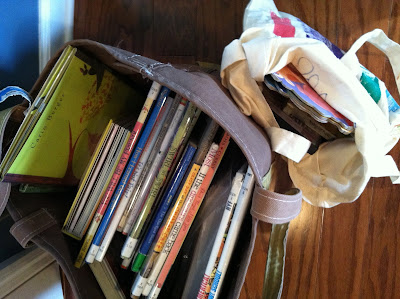This week we were all on a hunt for some new Christmas books to read (it was our Advent calendar activity for that day). I looked up some Christmas-y titles on the computer card catalog and starting browsing the shelves to find the books on my list.
My boys were wandering aimlessly so I enlisted their help. "Can you boys help me find this list of books? There's a lot of them. Work together and start by looking for 'E FON', then see if you find a Christmas book there." (I didn't write down all the book titles on my list.)
They were so excited to go hunting! My little guy wasn't able to find the call numbers himself, but with a little help from his big brother or from me, he could! Trying to then hunt out the Christmas title with that particular call number I gave them was like a treasure hunt. They were so proud of themselves with each book they found.
When we completed hunting out the books on our list, they begged me to make a new list so they could find some more. They seriously could have done that all day. And what great practice with their library skills and even practice with their alphabet and spelling.
To Have a Fun Library Book Hunt...
1. Choose a theme of books to look for (Holiday, Dogs, Back to School, etc.)
2. Do a computer catalog search and make a list of books to hunt for o
n the shelves. (You could involve your kids in this part too if you want.) Decide if you want to write down the book titles or just let your chosen theme guide your kiddos in hunting out the correct books.
3. Give your kids a list of the library call numbers your copied from the computer catalog. Or verbally tell your kids the call numbers as you go. If you want, you could write a few separate call numbers on separate sheets of paper and give one paper to each child. Let them race to find all the books on their list (if you trust them to not get too competitive and disruptive).
4. Assist younger children with this activity. It's great fun and helps them practice their alphabet and library skills. We sang the alphabet song a few times as we hunted for our books.


















































































